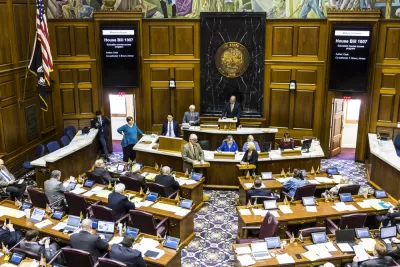Just past midnight on Saturday morning, the Indiana State Senate passed the transportation plan after the Housed approved it Friday. It also passed a $32 billion, two-year state budget bill, then adjourned for the year, one week ahead of schedule.

The last time the state of Indiana's 18-cents-per-gallon gasoline excise tax was increased was 2003. The total tax, which includes a monthly variable gasoline use tax rate of over 13 cents-per-gallon that goes to the state general fund, plus 1 cpg inspection fee, was 32.84 cents per gallon as of April 1, according to the American Petroleum Institute.
Capturing the successful close of the 2017 legislative session was Mike Perleberg of Eagle Country.
“This session’s historic, transforming achievements include the passage of the largest state and local infrastructure investment in Indiana’s history and a structurally balanced state budget,” said House Speaker Brian Bosma (R-Indianapolis).
The transportation plan will pump an average of $1.2 billion in new money annually into road infrastructure beginning in 2024. About $850 million of that yearly amount would be designated by state highways while local roads would receive about $350 million.
The 10-cent gasoline excise tax will be phased-in: 5-cents on July 1 of this year, and 5-cents on July 1, 2018. House Bill 1002 by Rep. Edmond Soliday, has the support of Gov. Eric J. Holcomb, the former lieutenant governor who was elected as governor after he replaced now-Vice President Mike Pence on the November ballot.
According to Kaitlin L Lange and Tony Cook of The Indianapolis Star on Thursday, a major issue of the legislation was the gasoline use tax on fuel, whether it should be diverted to road programs from the state General Fund
The House pushed for all of the gas sales tax money to be shifted to roads even before this legislative session, but the Senate was reluctant.
The compromise was to split the funding between local roads and bridges, state highway, and the General Fund until state fiscal year 2025, when all funds go to roads. Total loss to the state would be $350 million per year, according to Lange and Cook.
Other significant parts of the bill include:
- Increasing the diesel (or "special") excise fuel tax rate, now 16 cpg, and motor carrier tax, now 11 cpg, by ten cents per gallon but eliminating the state 7 percent sales tax on diesel fuel.
- Indexing fuel tax rates until July 1, 2024. Annual increases are capped at one-cent-per-gallon.
- Adding a $15 motor vehicle registration fee.
- Adding an annual electric vehicle fee of $150 (similar to the California and Tennessee legislation that passed earlier), adjusted every 5 years for inflation.
- Adding an annual hybrid vehicle fee of $50, adjusted every 5 years for inflation.
- Requiring the Indiana Department of Transportation to seek a Federal Highway Administration waiver to toll interstate highways, described in greater detail in a February post.
- On other roads, it "gives the governor the power to add tolls, if approved by the State Budget Committee," according to Neil Abt of Fleet Owner.
Abt adds that the Tennessee bill must return to the House "due to non-transportation-related changes the Senate added to its version." He also notes that South Carolina and Minnesota are debating gas tax increases, while the Colorado legislature struggles to pass a bill to allow for a plebiscite to increase the state sales tax to fund transportation projects.
FULL STORY: Lawmakers Pass Budget, Road Funding, Gas Tax Increase As Session Comes To A Close

Study: Maui’s Plan to Convert Vacation Rentals to Long-Term Housing Could Cause Nearly $1 Billion Economic Loss
The plan would reduce visitor accommodation by 25,% resulting in 1,900 jobs lost.

North Texas Transit Leaders Tout Benefits of TOD for Growing Region
At a summit focused on transit-oriented development, policymakers discussed how North Texas’ expanded light rail system can serve as a tool for economic growth.

Why Should We Subsidize Public Transportation?
Many public transit agencies face financial stress due to rising costs, declining fare revenue, and declining subsidies. Transit advocates must provide a strong business case for increasing public transit funding.

How to Make US Trains Faster
Changes to boarding platforms and a switch to electric trains could improve U.S. passenger rail service without the added cost of high-speed rail.

Columbia’s Revitalized ‘Loop’ Is a Hub for Local Entrepreneurs
A focus on small businesses is helping a commercial corridor in Columbia, Missouri thrive.

Invasive Insect Threatens Minnesota’s Ash Forests
The Emerald Ash Borer is a rapidly spreading invasive pest threatening Minnesota’s ash trees, and homeowners are encouraged to plant diverse replacement species, avoid moving ash firewood, and monitor for signs of infestation.
Urban Design for Planners 1: Software Tools
This six-course series explores essential urban design concepts using open source software and equips planners with the tools they need to participate fully in the urban design process.
Planning for Universal Design
Learn the tools for implementing Universal Design in planning regulations.
Ascent Environmental
Borough of Carlisle
Institute for Housing and Urban Development Studies (IHS)
City of Grandview
Harvard GSD Executive Education
Toledo-Lucas County Plan Commissions
Salt Lake City
NYU Wagner Graduate School of Public Service




























